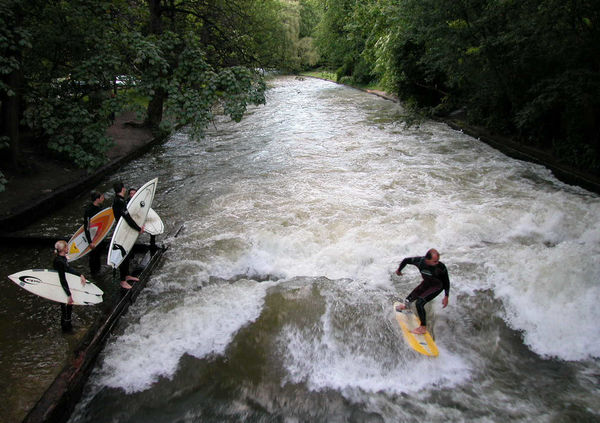Offbeat Europe
By Rick StevesNo one planning a trip to Europe needs to be reminded to see Big Ben and the Leaning Tower. But it's the unusual experiences that are often the most memorable part of a trip. In this first article of a two-part series, I've lined up some of my favorite quirky experiences:
Skinny-Dipping in Downtown Munich: Munich's Central Park, the English Garden, offers a variety of offbeat things to explore. Up to 300,000 locals commune with nature here on a hot summer day...many of them buck naked. Nudism, denoted in German by the code letters "F.K.K.," is perfectly legal and widely practiced here — quite a spectacle to most Americans (they're the ones riding their rental bikes into the river and trees). And here, buried far from the nearest stretch of coast, surfers "hang ten" in the rapids of the city's little river. While seeking their thrills, they provide great entertainment for the ever-present little crowd that gathers to watch from the bridge.
Salzburg's Super-Soaker Prince: Salzburg's 17th-century Hellbrunn Castle entertains with a garden full of trick fountains and tour guides sadistically soaking tourists. At the touch of a button, paths and benches turn into fountains and visitors get doused. It's silly fun, especially with kids on a sunny day.
Europe's Skinniest Park: Paris' skinny, two-mile-long Promenade Plantée park is a narrow garden walk on a viaduct no longer used for train tracks. The elevated park, which cuts through lots of modern condos, gives a fun peek into the workaday lives of Parisians today. Staircases lead to the street level, where artsy, offbeat shops fill the viaduct's arches. The park runs from Place de la Bastille along Avenue Daumesnil to Saint-Mandé.
Skiing in Edinburgh: If you'd rather be skiing, the Midlothian Ski Centre, just outside Edinburgh, has a brush-skiing hill with a chairlift, two slopes, a jump slope, and rentable skis, boots, and poles. While you're actually skiing over what seems like a million toothbrushes, it feels like snow skiing on a slushy day. It's open nearly year round (except, ironically, when it snows). Beware: Local doctors are used to treating an ailment called "Hillend Thumb" — digits dislocated when people fall and get tangled in the brush.
The Tide Went Out and Never Came Back: Holland is twice as big today as it was 300 years ago. How? By "reclaiming" land from the sea using dikes and windmill-powered pumps. During the process, many tiny islands — home to traditional fishing villages — were stranded high and dry and today stand in the middle of Dutch farmland. The fishing village of Schokland, once on an island in the Zuiderzee, is one such village. The village has a now-useless lighthouse, and you can walk right up to a buoy that once bobbed in the harbor. A bent and rusty propeller from a WWII English bomber ornaments the village square...a reminder that when farmers first tilled their new soil, they uncovered more than just muck and mollusks.
Roman Pyramid: You don't need to go to Egypt to see an ancient pyramid. Standing 90 feet tall, Rome's pyramid was built in 12 BC as a tomb for the Roman Gaius Cestius, after the Cleopatra and Mark Antony scandal brought exotic Egyptian styles into vogue. Later the pyramid was incorporated into Rome's city wall.
Choco-sightseeing: Along with its rich culture, Europe is loved for its delicious chocolate. All day long, rivers of molten chocolate work their way through factories into small foil packages. While chocolate factory tours are rare, many welcome visitors with museums, showrooms, video presentations, and free tasting rooms. Chocoholics love the Imhoff-Stollwerck Chocolate Museum in Cologne. Their self-proclaimed "Mmmuseum" takes you on a tour from the origin of the cocoa bean to the finished product. You can see displays on the culture of chocolate and watch treats trundle down the conveyor belt in the functioning chocolate factory, the museum's highlight.
Whether skiing in Edinburgh or skinny-dipping in Munich, the unusual sights are a fun way to get some distance from the crowds and lighten up a museum-heavy itinerary.


